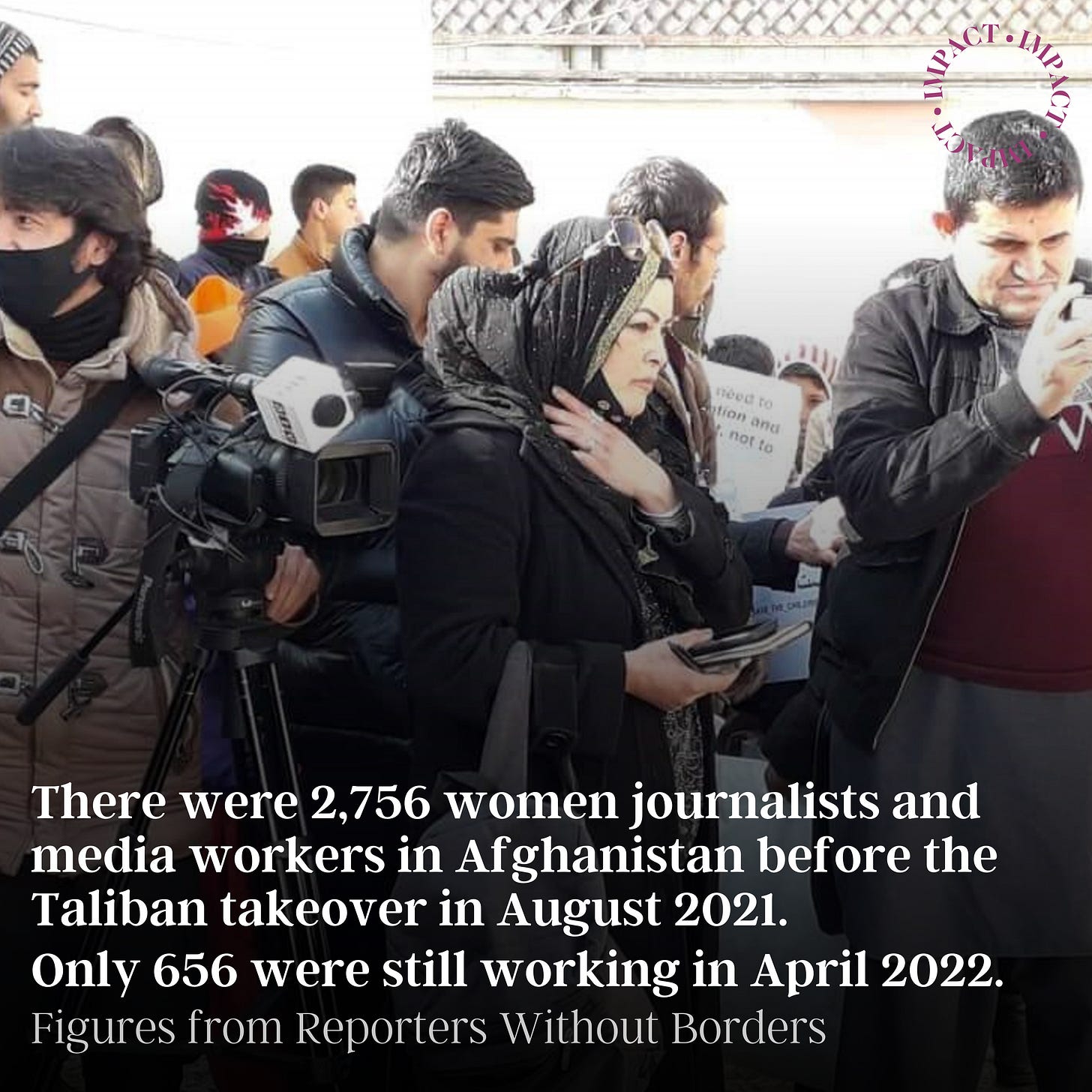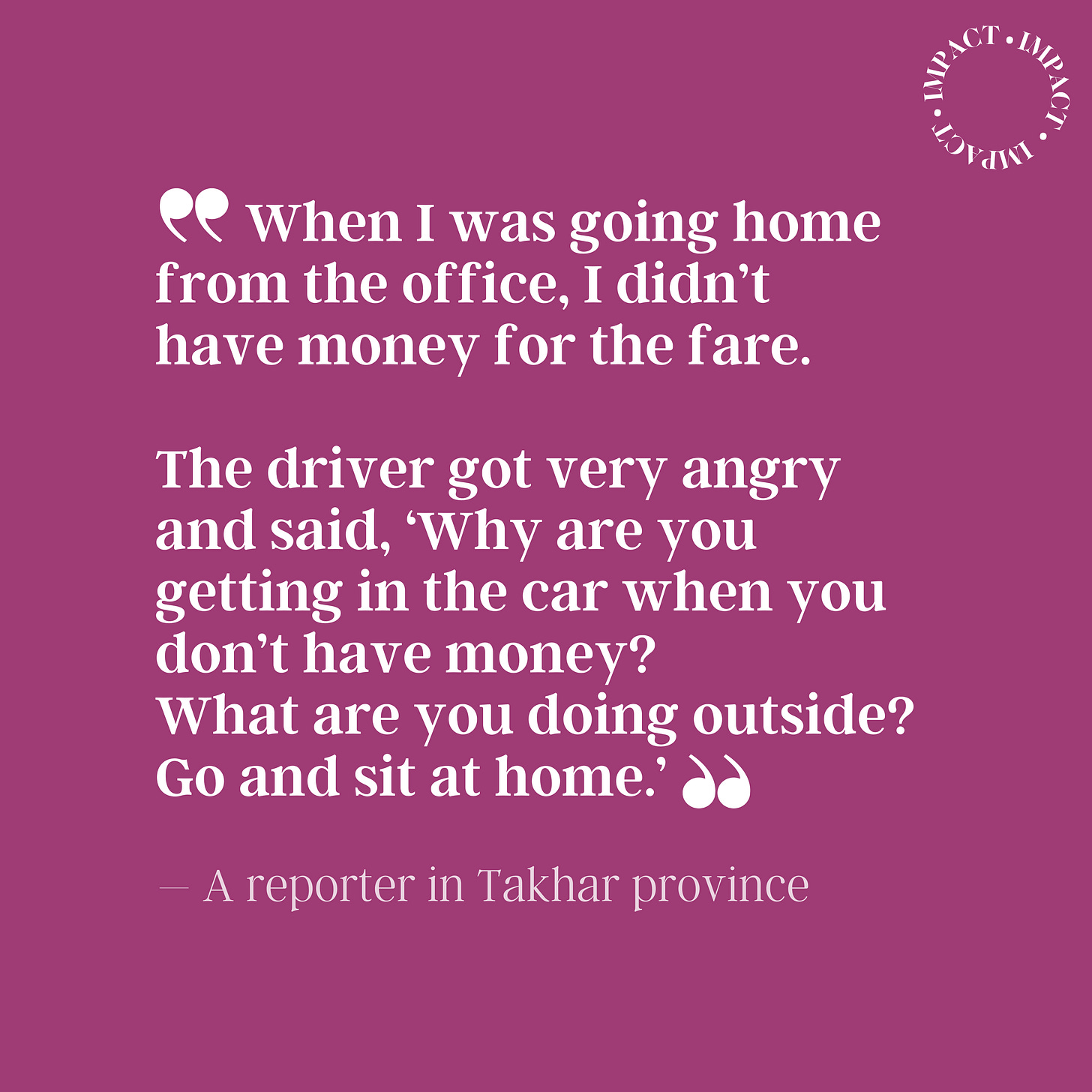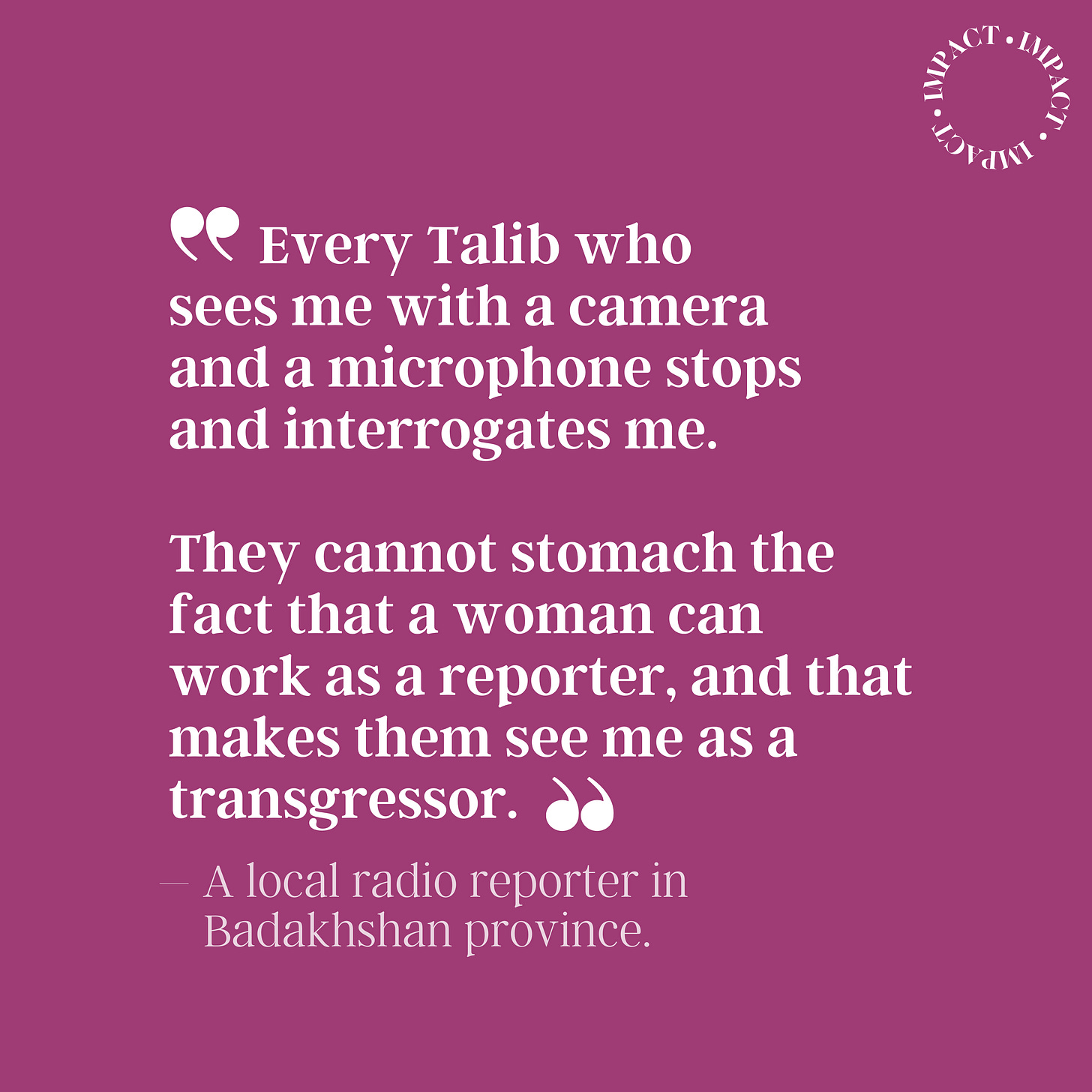Afghanistan’s last remaining women reporters are working for free
A special report from Afghan newsroom Zan Times
Only have a minute to read this newsletter? Here it is in brief:
🇦🇫 Since the Taliban takeover of Afghanistan, thousands of women journalists have lost their jobs.
🖊️ Those who remain often have to work for no pay, while facing near-constant Taliban harassment and intimidation – but they say they won’t stop reporting.
📰 Read this investigation from our friends at Zan Times, a women-led Afghan newsroom. You can also make a donation to support Zan Times in providing opportunities for Afghan journalists.
Read on for more. And if you want to be up-to-date on feminism worldwide, follow us on Twitter and Instagram.
Parlez-vous français ? Impact is also available in French:
By Freshta Ghani and Mahtab Safi for Zan Times
Marwa Jalil* is a journalist with five years of experience as a local radio reporter in Badakhshan province in northern Afghanistan. The 24-year-old is one of the few women journalists still working in public in the country.
Jalil used to earn 17,000 afghani (€180) a month but, after the Taliban took over Afghanistan, her radio station decided to fire all its women journalists.
“The head of radio told us to keep working if we would work for free, otherwise they would not pay the women reporters,” she recounts. “I thought to myself, ‘Working for free is better than staying at home and grieving.’”
For the past year-and-a-half, she has worked full-time in her profession for no salary or benefits. She isn’t alone. “Apart from me, 54 other women journalists work for free in Badakhshan; their economic situation is very dire, but this is the only way they can continue their work,” she says.
The station doesn’t even pay for her food or transportation costs while she works in the field. Luckily for Jalil, her father, who works for a non-governmental organisation, is able to subsidise those costs, at least for now. “With these high prices, I don’t know whether my father will pay for our family’s expenses or spare me some money for car rent and food. I am facing a lot of economic problems,” she says.
Like Marwa Jalil, dozens of women journalists in provinces including Herat, Badakhshan, Parwan, Kabul, Samangan, and Balkh are working without pay for local media organisations, according to the media watchdog group, NAI Supporting Open Media in Afghanistan.
“We have talked to the officials of these media several times about the salary of women reporters; they say that the reason is lack of funds,” NAI’s head, Zarif Karimi, told Zan Times. “They say, ‘If women journalists are not happy that we cannot pay them, then they can quit. We can do our work with one or two employees.’”
In August 2022, Reporters Without Borders released a report stating that, out of 2,756 women journalists and media workers in Afghanistan before the Taliban takeover, only 656 were still working. At that time, women media workers had already completely disappeared from 11 of the country’s 34 provinces, while 85 percent of those still-employed were based in Kabul.
Even if women journalists are still willing to work without pay, they face pressure from their family to quit their job. In neighbouring Takhar province, Narges Ansari* is facing a similar situation. As a veteran journalist with nine years’ experience, she was paid 10,000 afghani (€100) a month before the Taliban took power, but that salary was soon stopped, though she continues to work. “Many times my brother told me to quit this unpaid job. He recently warned me that if the media doesn’t pay you, you don’t have the right to go to work.”
Ansari has severe financial problems and her brother is struggling to pay household expenses, let alone find funds for her work-related transport needs. “A few days ago, when I was going home from the office, I didn’t have money for the fare,” she recounts. “The driver got very angry and said, ‘Why are you getting in the car when you don’t have money? What are you doing outside? Go and sit at home.’”
To see how women journalists are coping after 18 months under Taliban rule, Zan Times contacted 32 women journalists in 12 provinces. They recount security threats, harassment, and constant fear. Seventeen out of 32 women journalists who spoke to Zan Times lost their jobs after the Taliban took over (six were fired because they were women, six lost their jobs due to the closures of their media organizations, while another five quit due to restrictions and security issues). The other 15 have continued their work, despite facing gender discrimination, sexual harassment, security threats, pressure to abandon their jobs, unpaid work, lack of access to information, Taliban censorship, and mandatory hijab rules.
In March 2022, a survey by the Afghan National Journalists’ Union (ANJU) found that 87 percent of women journalists had “experienced gender discrimination,” while close to 79 percent said they had been “insulted and threatened under the Taliban regime, including physical threats, abuse by Taliban officials, written and verbal threats.” The survey also found that “87 percent of women journalists are not motivated to work in the current situation due to fear and panic.”
In December, the Taliban in Kandahar literally silenced women in the media by ordering that local organisations refrain from broadcasting women’s voices.
Taliban restrictions and a deteriorating business environment for media owners means that the media organisations that are still open prefer having male reporters to avoid conflicts with Taliban officials. Mahsa*, a TV reporter in Herat province said a prospective employer had told her that if she was hired as a reporter, then the Taliban “will come to our office every day and harass us on various pretexts. That’s why we don’t hire any female reporters.”
Even those who are still able to work tell Zan Times they regularly face sexual harassment and discrimination in the workplace, as well as when they leave the newsroom to do their jobs.
Raihana*, a local reporter in northern Afghanistan (for her security, Zan Times is not identifying her province), was harassed during an interview with a senior Taliban official. The incident occurred in December 2022 when she went to interview him.
“He was not in the office. One of his employees guided me to another room … I got scared by the way he was staring at me and I cut the interview short and packed my things. When I tried to get out, I found the door was locked. I was about to scream when he unlocked the door for me, and let me out.”
Soon after, the same Taliban official invited Raihana back to the directorate of information and culture. “When I said that I could not come, he told me to wait for the consequences of what will happen to me and don’t complain anymore,” she tells Zan Times. “After that day, I was not allowed to enter any [government] venue for any event.”
In addition to harassment, all the women journalists who spoke to Zan Times complain of constant gender discrimination, such as being prevented from attending press conferences because they are women.
This happened to journalist Mina Habib, head of the Roidad News Agency, in October 2022 while trying to cover the aftermath of the terrorist bombing at the Kaaj educational centre in Kabul that killed at least 55, most of them women. That day, she reported the incident in a message to Zan Times: “This morning, the [Taliban] forces, with discriminatory behaviour, did not let me cover an event about the martyrs of the Kaaj education centre.”
Marwa Jalil*, the journalist in Badakhshan province, faces the same situation every day. “Every time I go [into the field] to prepare a report, every Talib who sees me with a camera and a microphone stops and interrogates me,” she tells Zan Times. “They cannot stomach the fact that a woman can work as a reporter, and that makes them see me as a transgressor.”
Even as the Taliban makes it harder and harder to do their jobs, women journalists say they will continue to work in their profession. They have chosen to persevere.
*Names have been changed to protect the identity of the interviewees.
Thank you to Zan Times for allowing us to republish this story. You can read the original here.
About Zan Times
Zan Times is a women-led, investigative newsroom that covers human rights violations in Afghanistan with a focus on women, the LGBTQ community, and environmental issues. It is a group of mainly women journalists working both inside and outside Afghanistan to tell stories of marginalised populations who rarely have a voice to shape and inform public discourse.
To support women-led reporting on Afghanistan under the Taliban, please consider making a donation.
Book giveaway
Did you miss out on the giveaway of Hawon Jung’s book, Flowers of Fire, last week? You can win a copy in our Instagram competition this week! Follow us here to take part.






